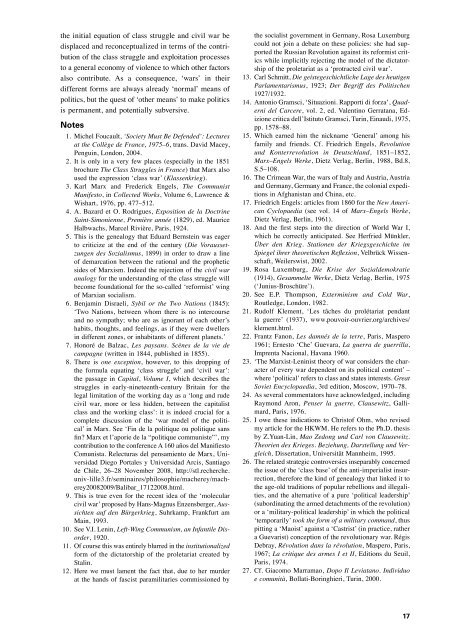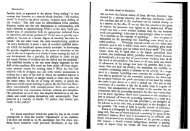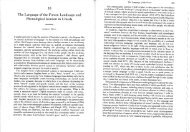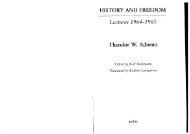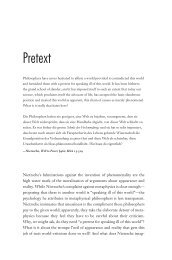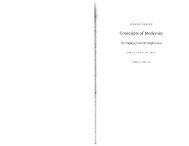Balibar Marxism and War.pdf - Townsend Humanities Lab
Balibar Marxism and War.pdf - Townsend Humanities Lab
Balibar Marxism and War.pdf - Townsend Humanities Lab
Create successful ePaper yourself
Turn your PDF publications into a flip-book with our unique Google optimized e-Paper software.
the initial equation of class struggle <strong>and</strong> civil war be<br />
displaced <strong>and</strong> reconceptualized in terms of the contribution<br />
of the class struggle <strong>and</strong> exploitation processes<br />
to a general economy of violence to which other factors<br />
also contribute. As a consequence, ‘wars’ in their<br />
different forms are always already ‘normal’ means of<br />
politics, but the quest of ‘other means’ to make politics<br />
is permanent, <strong>and</strong> potentially subversive.<br />
Notes<br />
1. Michel Foucault, ‘Society Must Be Defended’: Lectures<br />
at the Collège de France, 1975–6, trans. David Macey,<br />
Penguin, London, 2004.<br />
2. It is only in a very few places (especially in the 1851<br />
brochure The Class Struggles in France) that Marx also<br />
used the expression ‘class war’ (Klassenkrieg).<br />
3. Karl Marx <strong>and</strong> Frederick Engels, The Communist<br />
Manifesto, in Collected Works, Volume 6, Lawrence &<br />
Wishart, 1976, pp. 477–512.<br />
4. A. Bazard et O. Rodrigues, Exposition de la Doctrine<br />
Saint-Simonienne, Première année (1829), ed. Maurice<br />
Halbwachs, Marcel Rivière, Paris, 1924.<br />
5. This is the genealogy that Eduard Bernstein was eager<br />
to criticize at the end of the century (Die Voraussetzungen<br />
des Sozialismus, 1899) in order to draw a line<br />
of demarcation between the rational <strong>and</strong> the prophetic<br />
sides of <strong>Marxism</strong>. Indeed the rejection of the civil war<br />
analogy for the underst<strong>and</strong>ing of the class struggle will<br />
become foundational for the so-called ‘reformist’ wing<br />
of Marxian socialism.<br />
6. Benjamin Disraeli, Sybil or the Two Nations (1845):<br />
‘Two Nations, between whom there is no intercourse<br />
<strong>and</strong> no sympathy; who are as ignorant of each other’s<br />
habits, thoughts, <strong>and</strong> feelings, as if they were dwellers<br />
in different zones, or inhabitants of different planets.’<br />
7. Honoré de Balzac, Les paysans. Scènes de la vie de<br />
campagne (written in 1844, published in 1855).<br />
8. There is one exception, however, to this dropping of<br />
the formula equating ‘class struggle’ <strong>and</strong> ‘civil war’:<br />
the passage in Capital, Volume I, which describes the<br />
struggles in early-nineteenth-century Britain for the<br />
legal limitation of the working day as a ‘long <strong>and</strong> rude<br />
civil war, more or less hidden, between the capitalist<br />
class <strong>and</strong> the working class’: it is indeed crucial for a<br />
complete discussion of the ‘war model of the political’<br />
in Marx. See ‘Fin de la politique ou politique sans<br />
fin? Marx et l’aporie de la “politique communiste”’, my<br />
contribution to the conference A 160 años del Manifiesto<br />
Comunista. Relecturas del pensamiento de Marx, Universidad<br />
Diego Portales y Universidad Arcis, Santiago<br />
de Chile, 26–28 November 2008, http://stl.recherche.<br />
univ-lille3.fr/seminaires/philosophie/macherey/macherey20082009/<strong>Balibar</strong>_17122008.html.<br />
9. This is true even for the recent idea of the ‘molecular<br />
civil war’ proposed by Hans-Magnus Enzensberger, Aussichten<br />
auf den Bürgerkrieg, Suhrkamp, Frankfurt am<br />
Main, 1993.<br />
10. See V.I. Lenin, Left-Wing Communism, an Infantile Disorder,<br />
1920.<br />
11. Of course this was entirely blurred in the institutionalized<br />
form of the dictatorship of the proletariat created by<br />
Stalin.<br />
12. Here we must lament the fact that, due to her murder<br />
at the h<strong>and</strong>s of fascist paramilitaries commissioned by<br />
the socialist government in Germany, Rosa Luxemburg<br />
could not join a debate on these policies: she had supported<br />
the Russian Revolution against its reformist critics<br />
while implicitly rejecting the model of the dictatorship<br />
of the proletariat as a ‘protracted civil war’.<br />
13. Carl Schmitt, Die geistegeschichtliche Lage des heutigen<br />
Parlamentarismus, 1923; Der Begriff des Politischen<br />
1927/1932.<br />
14. Antonio Gramsci, ‘Situazioni. Rapporti di forza’, Quaderni<br />
del Carcere, vol. 2, ed. Valentino Gerratana, Edizione<br />
critica dell’Istituto Gramsci, Turin, Einaudi, 1975,<br />
pp. 1578–88.<br />
15. Which earned him the nickname ‘General’ among his<br />
family <strong>and</strong> friends. Cf. Friedrich Engels, Revolution<br />
und Konterrevolution in Deutschl<strong>and</strong>, 1851–1852,<br />
Marx–Engels Werke, Dietz Verlag, Berlin, 1988, Bd.8,<br />
S.5–108.<br />
16. The Crimean <strong>War</strong>, the wars of Italy <strong>and</strong> Austria, Austria<br />
<strong>and</strong> Germany, Germany <strong>and</strong> France, the colonial expeditions<br />
in Afghanistan <strong>and</strong> China, etc.<br />
17. Friedrich Engels: articles from 1860 for the New American<br />
Cyclopaedia (see vol. 14 of Marx–Engels Werke,<br />
Dietz Verlag, Berlin, 1961).<br />
18. And the first steps into the direction of World <strong>War</strong> I,<br />
which he correctly anticipated. See Herfried Münkler,<br />
Über den Krieg. Stationen der Kriegsgeschichte im<br />
Spiegel ihrer theoretischen Reflexion, Velbrück Wissenschaft,<br />
Weilerswist, 2002.<br />
19. Rosa Luxemburg, Die Krise der Sozialdemokratie<br />
(1914), Gesammelte Werke, Dietz Verlag, Berlin, 1975<br />
(‘Junius-Broschüre’).<br />
20. See E.P. Thompson, Exterminism <strong>and</strong> Cold <strong>War</strong>,<br />
Routledge, London, 1982.<br />
21. Rudolf Klement, ‘Les tâches du prolétariat pendant<br />
la guerre’ (1937), www.pouvoir-ouvrier.org/archives/<br />
klement.html.<br />
22. Frantz Fanon, Les damnés de la terre, Paris, Maspero<br />
1961; Ernesto ‘Che’ Guevara, La guerra de guerrilla,<br />
Imprenta Nacional, Havana 1960.<br />
23. ‘The Marxist-Leninist theory of war considers the character<br />
of every war dependent on its political content’ –<br />
where ‘political’ refers to class <strong>and</strong> states interests. Great<br />
Soviet Encyclopaedia, 3rd edition, Moscow, 1970–78.<br />
24. As several commentators have acknowledged, including<br />
Raymond Aron, Penser la guerre, Clausewitz, Gallimard,<br />
Paris, 1976.<br />
25. I owe these indications to Christof Ohm, who revised<br />
my article for the HKWM. He refers to the Ph.D. thesis<br />
by Z.Yuan-Lin, Mao Zedong und Carl von Clausewitz.<br />
Theorien des Krieges. Beziehung, Darstellung und Vergleich,<br />
Dissertation, Universität Mannheim, 1995.<br />
26. The related strategic controversies inseparably concerned<br />
the issue of the ‘class base’ of the anti-imperialist insurrection,<br />
therefore the kind of genealogy that linked it to<br />
the age-old traditions of popular rebellions <strong>and</strong> illegalities,<br />
<strong>and</strong> the alternative of a pure ‘political leadership’<br />
(subordinating the armed detachments of the revolution)<br />
or a ‘military-political leadership’ in which the political<br />
‘temporarily’ took the form of a military comm<strong>and</strong>, thus<br />
pitting a ‘Maoist’ against a ‘Castrist’ (in practice, rather<br />
a Guevarist) conception of the revolutionary war. Régis<br />
Debray, Révolution dans la révolution, Maspero, Paris,<br />
1967; La critique des armes I et II, Editions du Seuil,<br />
Paris, 1974.<br />
27. Cf. Giacomo Marramao, Dopo Il Leviatano. Individuo<br />
e comunità, Bollati-Boringhieri, Turin, 2000.<br />
17


